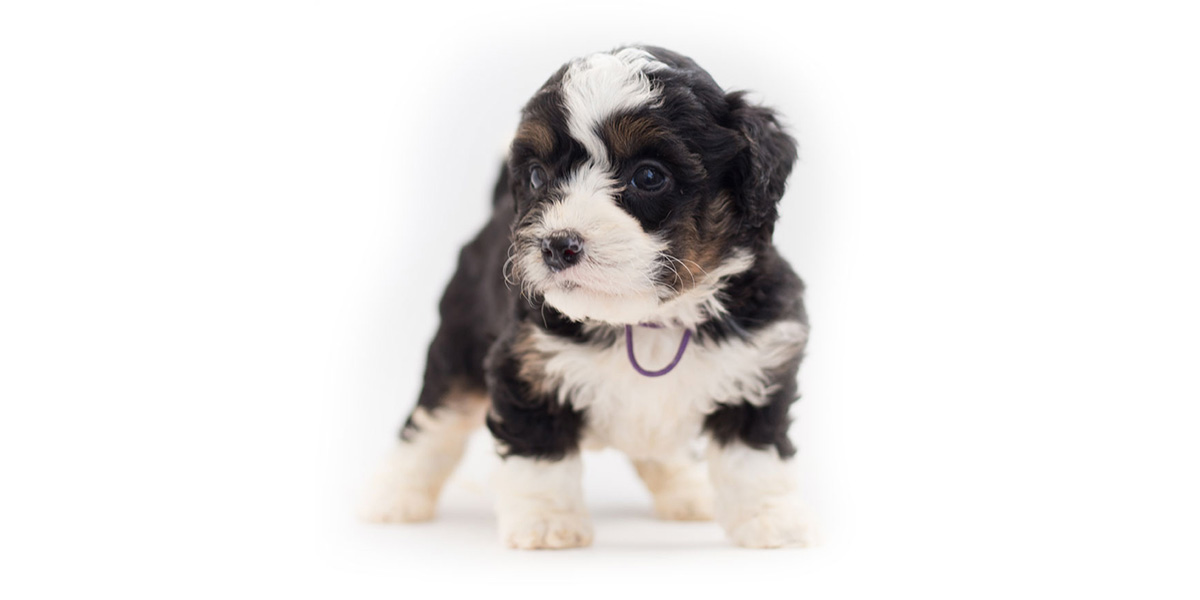Taking too long? Close loading screen.

May 11th
Bernedoodles, the adorable and friendly cross between a Bernese Mountain Dog and a Poodle, have gained popularity in recent years. Their low-shedding coats, intelligence, and loving nature make them an ideal choice for families and individuals alike. However, when considering bringing a Bernedoodle into your home, it’s essential to understand the costs associated with feeding this breed. Ensuring proper nutrition is crucial for the overall health and happiness of your furry companion. This blog post will cover various factors that affect feeding costs, types of dog food, and tips to help you manage expenses while providing the best care for your Bernedoodle.
There are three different sizes of Bernedoodles, each with unique feeding requirements:
The size and weight of your Bernedoodle play a significant role in determining the amount of food they require, ultimately affecting the feeding costs.
Bernedoodles, like all dogs, have different dietary needs at various stages of their lives:
Understanding your dog’s age and adjusting their diet accordingly will help manage feeding costs.
Bernedoodles have varying activity levels, which impact their dietary requirements:
Active dogs require more calories to maintain their energy levels, which in turn affects the feeding costs.
Dry kibble is the most common type of dog food, available in various price ranges:
Choosing the right dry kibble for your Bernedoodle will depend on your budget and the nutritional needs of your dog.
Wet or canned food is another option, which is typically more expensive than dry kibble:
Wet food can be a suitable option for picky eaters or those with dental issues, but it may increase feeding costs.
A raw diet is an alternative approach to feeding your Bernedoodle, consisting mainly of raw meat, bones, and organs:
Raw diets can provide optimal nutrition and improve coat condition, but it is essential to consult with a veterinarian before starting your Bernedoodle on a raw diet to ensure proper balance and safety.
Home-cooked meals are another option for feeding your Bernedoodle, allowing for complete control over ingredients and quality:
Consulting with a veterinarian or pet nutritionist is essential when preparing home-cooked meals to ensure a balanced diet for your Bernedoodle.
To determine your Bernedoodle’s daily caloric needs, consider the following factors:
Once you have considered the factors affecting your Bernedoodle’s caloric needs, you can calculate their daily caloric intake:
Calculating the cost per calorie for different types of dog food will help you understand the cost implications of your chosen feeding method. Dry kibble tends to be more cost-effective, while wet food, raw diets, and home-cooked meals can be more expensive, depending on the ingredients and quality.
Once you have calculated your Bernedoodle’s daily caloric intake and determined the cost per calorie for your preferred type of food, you can estimate monthly feeding costs by multiplying the daily caloric intake by the cost per calorie and then by 30 (the approximate number of days in a month).
Remember that your Bernedoodle’s dietary needs and preferences may change over time, requiring adjustments to their feeding plan and budget. Regularly reassessing their diet and caloric intake can help you maintain optimal nutrition while managing costs.
Buying dog food in bulk can help you save money in the long run, especially if you have a larger Bernedoodle or multiple pets. Look for sales, discounts, and wholesale options when purchasing dog food.
Keep an eye out for coupons, discounts, and promotions offered by pet food manufacturers and retailers. Signing up for newsletters or loyalty programs can also provide access to exclusive deals, helping you save on feeding costs.
Periodically reassess your Bernedoodle’s diet to ensure it continues to meet their nutritional needs as they grow and their activity levels change. Adjusting portion sizes, changing food types, or incorporating supplements can help maintain optimal health while managing costs.
Preparing homemade dog food and treats can be a cost-effective way to provide your Bernedoodle with nutritious meals and snacks. Look for recipes that use affordable, high-quality ingredients and consult with a veterinarian or pet nutritionist to ensure a balanced diet.
While higher-quality dog food may have a higher upfront cost, investing in premium options can have long-term health benefits for your Bernedoodle. Better-quality food can lead to fewer health issues, reducing veterinary expenses and improving your dog’s overall quality of life.
Depending on your Bernedoodle’s specific needs, supplements and vitamins may be recommended to support their overall health. Talk to your veterinarian about appropriate supplements and include these costs in your feeding budget.
Dog treats are an essential part of training and bonding with your Bernedoodle, but they can also contribute to feeding costs. Be mindful of the type and quantity of treats you provide, and consider making homemade treats as a cost-effective alternative.
Dental chews help maintain your Bernedoodle’s oral health and can reduce the risk of dental issues. Include the cost of dental chews in your feeding budget, and look for deals or bulk purchasing options to save money.
Feeding accessories, such as bowls, storage containers, and slow feeders, are essential for providing your Bernedoodle with a comfortable and hygienic eating environment. While these costs are typically one-time or infrequent expenses, it’s essential to factor them into your overall feeding budget.
Understanding the various factors that influence feeding costs and exploring different dog food options can help you make informed decisions about your Bernedoodle’s diet. Remember that investing in proper nutrition is crucial for your dog’s overall health and well-being. By following the tips and guidance provided in this blog post, you can ensure that your Bernedoodle receives the nourishment they need while keeping feeding costs manageable. Happy feeding!
Find the Perfect Puppy